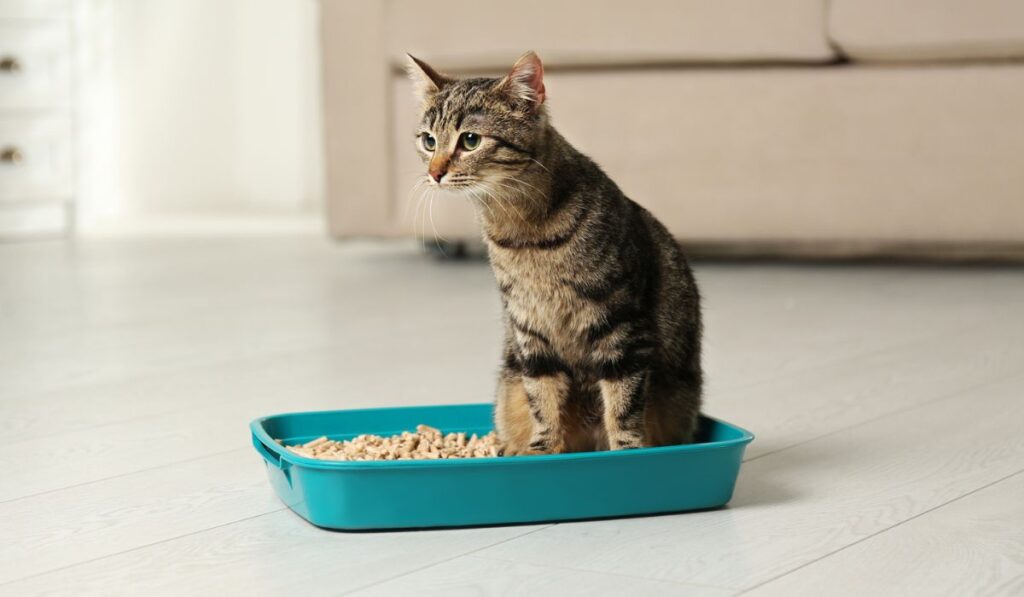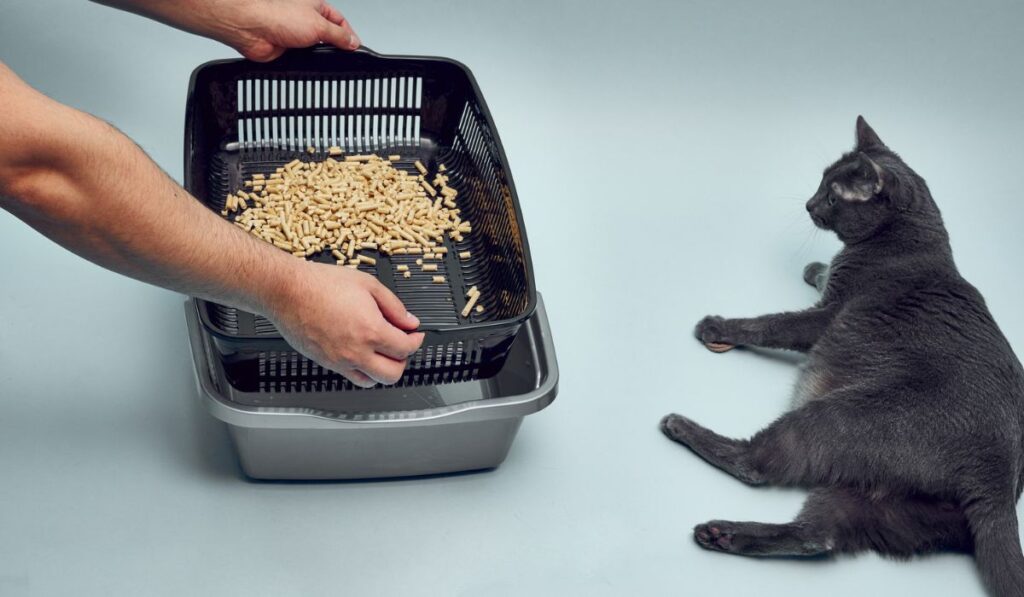Having cats is adorable; there is no doubt about that. But cleaning the litter box can be an irritable job, and flushing it down the toilet may sound easier, but is it good for your toilet?
Whether you choose to have flushable or non-flushable cat litter, flushing it can still cause a build-up in your pipes and clogging. This is why you should never flush cat litter down the toilet. Instead, you should dispose of it in a trash can.
So what’s the best way to dispose of cat litter? Let’s look at why you shouldn’t flush it down the toilet and what happens if you do.
Is it Okay to Flush Cat Litter Down the Toilet?

You have a bit of variety when choosing your cat litter. The choice of clumping or non-clumping clay and even some natural litter. Some are advertised as flushable if you mix them with water, which will cause them to break down. Unfortunately, there are also cat litters that you cannot flush.
Any kind of cat litter that is clay-based is not flushable. Some of the biodegradable ones can be, but only if it’s listed on the packaging. Although it may seem easier to flush cat litter into the toilet, some issues may arise with flushing any litter.
As a general rule, it is never recommended to flush cat litter down the toilet, no matter the type of litter.
What Happens if You Flush Cat Litter?
As you may assume, dumping litter in the toilet can cause a significant clogging risk in your plumbing system. What happens is that the litter absorbs the water and expands, as it is designed to when cats pee on it.
Pipe Damage
Expanding cat litter can cause major damage to your pipes, resulting in a high number of repairs. Not to mention flushing cat litter can harm the ecosystem where the water is pumped out on the other end.
Think that is bad? Well, the clumps of urine may not affect your pipes as much as the stool. Nowadays, you may have modern wastewater treatment plants, but they are designed to filter out human parasites. Meaning they may not catch some of the parasites specific to cats.
Health Risks
Breathing in the toxins from all the bacteria and viruses that come from cat feces can cause health issues for humans and animals. So the best thing to do, for the sake of keeping your pipes free of clogs and harming the environment, is to dispose of the “cat” litter elsewhere correctly.
An infectious parasite called Toxoplasma gondii is found in cat poo, which can cause a potential health problem. More often, it is found in the feces of outdoor cats.
This disease can be linked to schizophrenia, obsessive-compulsive disorder, rheumatoid arthritis, brain cancer, and can even result in children having trouble in school.
When cats eat infected birds, mice, or other small animals, they become infected. If you have an indoor cat, you don’t have to worry as much. Just make sure to take care when cleaning litter boxes. Any exposure to this parasite can trigger flu-like signs in the first few weeks.
What is the Best Way to Dispose of Cat Litter?

Getting a plumber involved because you flushed some cat poo is a huge hassle. The repairs will be costly, not to mention the time it will take to find an excellent plumber to check out all your pipes. If you’ve got a septic system, the repairs can be even more complicated.
Therefore it is best to dispose of cat litter in ways other than flushing it. Below are the top recommendations.
Putting it in the Trash
Have a bunch of bags leftover from the grocery store? Cleaning your pet’s litterbox is a perfect way to recycle those bags, and don’t forget to double-line the bag.
This way, it won’t leak through, causing a massive mess in your kitchen or garage. While this process may take a long time or seem like a hassle. It’s still relatively easy and hardly messy.
To be extra safe while scooping the urine and feces in the bag. You can put on a pair of gloves to avoid any contact with your skin. Also, make sure always to wash your hands before you touch your body or any food. This will help prevent any possible viruses or bacteria from going anywhere else.
Plastic Bags Alternatives
As an alternative to a new bag each time, you can use a recyclable or biodegradable bag. Using fewer single-use plastic bags reduces the amount of litter damaging ecosystems, which can also threaten wildlife and humans.
Using a biodegradable bag to dispose of the litter has the relevant heating needed for breaking down the cat litter. But before you dispose of it in the biodegradable bag, first scoop the water into the litter.
You can even use the litter for decorative gardens to be eco-friendly. In addition, it can be a good source of manure to aid your plants’ growth. Therefore, it is a win-win situation even for your plants.
Another way to avoid using plastic bags is to use newspaper or paper bags. These options will degrade quicker than plastic and are an ideal way to dispose of newspaper and brown paper instead of just tossing it in the trash.
Composting
If you’re looking to be more green, you can always use a DIY compost system to dispose of cat litter safely. There are even specific biodegradable cat litter options for this purpose that can be compostable.
Just make sure that your compost is set up not close to any garden with vegetables or even water sources, as runoff from the compost pile can contaminate food and water sources–whether animals or humans consume them.
While composting cat litter is okay, burning the cat litter would not be advised as it doesn’t burn completely. It will end up staying at the bottom of the barrel. Additionally, it can release harmful toxins in the air while burning.
Final Thoughts on Flushing Cat Litter
Now that you know that you probably shouldn’t flush cat litter down the toilet, less you run the risk of needing some expensive repairs, all that’s left to do is decide between throwing your cat’s litter in the garbage can or composting it.
Once you make your decision and stick to it, you’ll find cleaning up after a cat isn’t so bad at all, even without being able to flush their waste down the toilet.
